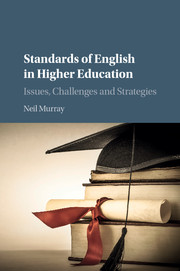Book contents
- Frontmatter
- Dedication
- Contents
- List of figures and tables
- Acknowledgements
- List of acronyms and abbreviations
- Introduction
- 1 The ‘English language question’ in the context of the changing face of higher education
- 2 English language: the need for and impact of policy and regulation
- 3 Seeking definitional clarity: what is ‘English language proficiency’?
- 4 Pre-enrolment language assessment and English language conditions of entry
- 5 Post-enrolment language assessment: challenges and opportunities
- 6 From assessment to provision
- 7 Innovation in English language provision: driving and navigating institutional change
- 8 Innovation in English language provision in higher education: an Australian case study
- References
- Appendices
- Index
3 - Seeking definitional clarity: what is ‘English language proficiency’?
Published online by Cambridge University Press: 05 November 2015
- Frontmatter
- Dedication
- Contents
- List of figures and tables
- Acknowledgements
- List of acronyms and abbreviations
- Introduction
- 1 The ‘English language question’ in the context of the changing face of higher education
- 2 English language: the need for and impact of policy and regulation
- 3 Seeking definitional clarity: what is ‘English language proficiency’?
- 4 Pre-enrolment language assessment and English language conditions of entry
- 5 Post-enrolment language assessment: challenges and opportunities
- 6 From assessment to provision
- 7 Innovation in English language provision: driving and navigating institutional change
- 8 Innovation in English language provision in higher education: an Australian case study
- References
- Appendices
- Index
Summary
Proficiency in context
Having contextualised the issue of English language in higher education in Chapters 1 and 2, the remainder of this book will look at the principles, practices and challenges relating to pre- and post-enrolment English language assessment; different permutations – and their respective implications – concerning English language development opportunities for those enrolled in degree programmes; and strategic approaches to the political complexities that are inevitably faced by those seeking to bring about significant change in this area within the current university climate. Before embarking on any such discussion, however, clarity needs to be brought to the somewhat elusive construct of ‘language proficiency’, without which it becomes virtually impossible to have a meaningful and coherent discussion of the situation of English in higher education and to formulate theoretically well-informed proposals concerning the assessment of English language and the systematic and targeted provision of appropriate, effective and sustainable initiatives concerning English language development (Dunworth, 2013; Dunworth, Drury, Kralik and Moore, 2013; Humphreys and Gribble, 2013). That such proposals should be well-informed and systematic is important, for it helps ensure that they are well-received by stakeholders internal to the university and more easily defensible to auditors working within regulatory frameworks and seeking to uphold standards.
In its 2013 government report, Five Years On: English Language Competence of International Students, the International Education Association of Australia (IEAA) acknowledged the challenges posed across the higher education sector by English language proficiency (ELP) definitions and terminology, noting that there had been a tendency to rely on test scores to describe proficiency levels and implicitly emphasising the fact that this is not the same thing as a clear articulation of the construct of language proficiency itself. The report continues:
ELP in higher education is being debated but … we are still struggling with our terminology and definitions. What is clear is that ELP in higher education settings is complex and challenging to define (Barrett-Lennard et al., 2011) and also that we have no agreed definition either of the construct itself or of the level of the construct that is appropriate (Dunworth, 2010; Webb, 2012).
(IEAA, 2013, p. 83)The definition of proficiency proposed in the Good Practice Principles (GPP) document discussed in Chapter 2 is fairly typical of the rather vague, ‘catch-all’ language in which proficiency is treated in such reports.
- Type
- Chapter
- Information
- Standards of English in Higher EducationIssues, Challenges and Strategies, pp. 69 - 98Publisher: Cambridge University PressPrint publication year: 2015



